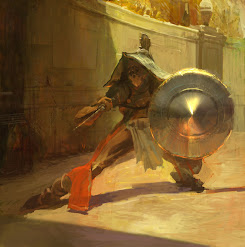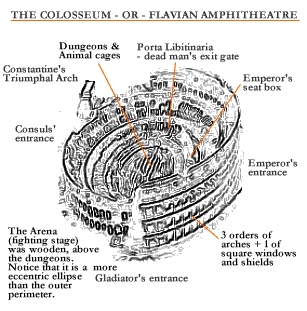For many years, I’ve been told that it was a huge foundational gap in my SF background, and that I really ought to read this classic. I’ve even got friends who, I suspect, have radically rethought and reworked their lives in view of the novel. I have been told, over and over, how radical and progressive the story is, and how much I will be challenged by what I find therein.
And perhaps if I’d read it earlier in life, their predictions of my reactions might have been more accurate. I suspect that, at 18 years of age, I would have been blown away by what I’d read. However, at double that span of years, I find that my reactions range along varying degrees of surprise, and not pleasant surprise either.
(This is not to be snarky toward those who did recommend the novel, mind you. For those who did recommend it, I thank you. It probably was high past time I'd read it. Additionally, this is not to disparage or denigrate those who got more out of the novel than I did. This is simply me working through my thoughts after reading the novel, no more and no less.)
For better or worse, I am one of the few people I know who is willing to accept most texts as-is, regardless of when they were written, or by whom, or in what context and society, without losing my ability to appreciate and enjoy them. Yes, I am quite aware that H.P. Lovecraft was a bigot and a racist, but I can gleefully read his stories and enjoy the same thrill I got when I was fourteen years old. The same goes for the racism and sexism I find in some of the works by Robert E. Howard, and others. Nor is this ability restricted to fiction; texts of philosophy and religion, same thing—read ‘em without batting an eye, usually.
I find, though, that these same offensive elements (well, offensive to me, anyway) seem to radically affect my ability to enjoy, if not appreciate, works when they appear in science fiction. I first encountered this unpleasant psychic disturbance when I encountered blatant sexism while reading the first novel of E.E. "Doc" Smith's Lensman series, Triplanetary. At the time, though, I figured it was simply an aberration, a glitch in my usual tolerance for difference in my reading material, and just shook it off. But I've had the same experience while reading Stranger in a Strange Land, and I feel the need to analyze my reactions.
The following passages, especially, stand out in my mind. (References are given as (chapter.page number) to allow for different copies of the book, and notes follow each passage.)
When speaking of the sexuality of the main character, Valentine Michael Smith, an earthling raised by Martians:
"He understood not wishing to be touched; Mike avoided shaking hands, he wanted to be touched only by water brothers. (Jill wasn't sure how far this went; she had explained homosexuality, after Mike had read about it and failed to grok--and had given him rules for avoiding passes; she knew that Mike, pretty as he was, would attract such. He had followed her advice and had made his face more masculine, instead of the androgynous beauty he had had. But Jill was not sure that Mike would refuse a pass, say, from Duke--fortunately, Mike's male water brothers were decidedly masculine, just as his others were very female women. Jill suspected that Mike would grok a "wrongness" in the poor in-betweeners anyhow--they would never be offered water.)"
(29.286)
So, wait, free love among water brothers ("brothers" being the word used for both males and females in the Martian water ceremony) is good, but homosexuality is bad, apparently an inherent wrongness? I didn't expect heterosexism in a text that was talked up as progressive, though I understand it in context of the writer and his time.
And when there is telepathic sharing between Michael and a female character, Jill:
"Jill found that she "grokked naughty pictures" only through a man's eyes. If Mike watched, she shared his mood, from sensuous pleasure to full rut--but if Mike's attention wandered, the model, dancer, or peeler was just another woman. She decided that this was fortunate; to have discovered in herself Lesbian [sic.] tendencies would have been too much."
(29.288)
So apparently gays, lesbians, and bisexuals are all out in the cold, along with a female appreciation of porn.
And then I read ...
"Nine times out of ten, if a girl gets raped, it's partly her fault."
(29.287)
... and if I need to say anything more about that quotation, then really I don't know what else to say.
And then there's the fact of men greeting each other with a kiss. Have to qualify that.
"Or take the early Christians ... even that kiss of brotherhood--Mike has borrowed a lot from them. Hmm ... if he picked up that kiss of brotherhood from them, I would expect men to kiss men."
Ben looked sheepish. "I held out on you. But it's not a pansy gesture"
"Nor was it with the early Christians."
(33.342)
I can perhaps see the necessity of this explanation for Western readers in 1961 (and perhaps today), but being raised in the Puerto Rican culture, I found it both unnecessary and annoying.
With regard to the novel's influence on others, I can only speculate. I have several thoughts and questions and suspicions rolling around in my brain. On the one hand, Stranger in a Strange Land seems to me to be, among other things, a brilliant satire of religion. Specifically, Robert Heinlein has created a fictional religion with its own fictional scripture, and like most scriptures it seems accurate within its own bounds, its own context. Like most scriptures, though, there are a lot of a priori assumptions about its correctness, in principle if not in fact. I am not convinced that any of the claims about human nature made in the novel would hold up on any real scale without the fictional foundation of learning the Martian language, and the changes said learning has on its "grokkers."
But I can't be too harsh with Heinlein. Ultimately, anybody trying to accurately predict the future is going to get it wrong ... including and especially science fiction writers,
I suppose that I expect science fiction stories, on the whole, to present more progressive, more egalitarian, more desirable and likeable societies, unless the authors clearly intend to use the societies as a warning rather than as a shining example of what we are capable of, as in the dystopias of 1984, Brave New World, We, Do Androids Dream of Electric Sheep, and Neuromancer, the first three demonstrating our worst desires for power and control run rampant, and the latter two demonstrating universes where empathy is clearly at war with entropy.
(And yes, that's my expectations interfering with my enjoyment of the novel; ultimately, it's not the writer's fault, it's not the work's fault, it's mine. I take full responsibility.)
(And what does it say about me that I prefer the dystopian novels, and find their worlds far easier to believe and relate to?)
To sum up many hours of contemplation: science fiction gets old quickly.
That either came out very wrong, or very right. Like most summations, probably both.
On the one hand, even the best science fiction (and perhaps especially the best science fiction) ages quickly. It has to. Science fiction, like so many products of our culture, has a built-in expiration date. I suspect that this fast aging is true of science fiction moreso than perhaps any other type of fiction. Advances of fields of knowledge invariably date previous assertions and beliefs. Like the technology, science, and knowledge it incorporates and speculates about, later writing leaves earlier works and speculations behind. As our culture inevitably changes to accompany, accommodate, and adapt to our changes in knowledge, so the field of science fiction leaves previous speculations looking like peculiar ruins and sad abstract art in the rearview mirror.
The field of science fiction is limited to our cultures, our times, and our knowledge, even as it attempts to transcend them.
But the fact that science fiction ages quickly is also a good thing, because a built-in expiration date helps keep science fiction from being backwards-looking. It encourages, if not guarantees, that the scope and scape of this shared imagination changes faster than we do.
The tomorrows envisioned may be better or worse, saner or madder, but they continue to metamorphose, change, evolve, transform, and (we hope) challenge us to discover or avoid the futures we see, hopefully inspiring us to be more than we are, or at least warning us of what we are capable of becoming.
In any event, tomorrow’s humans may be nothing like us, but we can hope that they will retain the sense of awe and wonder that drives many of these tales.
And after all of this introspection, I’m tempted to wonder if, had I read the book when I was 18, I wouldn’t have made the mistakes I did with regard to past relationships, assumptions and choices made, and opportunities not taken. But if I’m honest with myself, I am forced to amend that, though I may not have made the mistakes I did, I would simply have made different mistakes instead.

